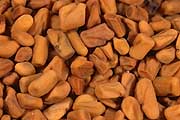Fenugreek Herb

Fenugreek has a long history of medical uses in Ayurvedic and Chinese medicine, and has been used for numerous indications, including labor induction, aiding digestion, and as a general tonic to improve metabolism and health. Applications of fenugreek were documented in ancient Egypt, where it was used in incense and to embalm mummies.
“Tea brewed from fenugreek herb (Trigonella foenumgraecum) breaks up congestion and loosens phlegm when you have a cold,” says Dr. Atkins in his book Dr Atkins Vita-nutrient Solution, “but the true medicinal talent of fenugreek rests in its seeds. In very large amounts (between 25 and 100 grams per day), pulverized seeds impressively reduce high blood fats and blood sugar for people with Type I and Type II diabetes.”
Recent studies have investigated the blood cholesterol-lowering and blood glucose-lowering properties of fenugreek seeds, both in normal subjects and in those with diabetes. Significant reductions in total cholesterol, LDL cholesterol and triglyceride levels, but not HDL cholesterol levels, have been observed in non-insulin-dependent diabetics consuming 25 grams of fenugreek per day. The beneficial effects were sustained over five to six months. With only five grams of fenugreek a day, fasting and postprandial blood glucose levels were significantly reduced in those persons with diabetes.
For diabetics who are insulin-dependent, a higher level of fenugreek is needed to significantly reduce fasting blood glucose levels, decrease urinary glucose levels, and decrease daily insulin requirements, as well as reduce LDL cholesterol and triglyceride levels. The cholesterol-lowering effect of fenugreek should be considered a valuable feature for the diabetic who usually has elevated blood lipids.
Although fenugreek has traditionally been considered safe and well tolerated, some side effects have been associated with its use, such as transient diarrhea and flatulence, dizziness, hypoglycemia, and decreased body weight. Fenugreek should not be used during pregnancy because of its potential uterine stimulating properties observed in early animal studies.
Remember: Herbal products and dietary supplements can have pharmacological effects, may produce adverse reactions in some people, and could interact with over-the-counter and prescription medications you may take. Discuss with your physician your decision to use any herbal product. Anything mentioned in this article is not intended to diagnose, prescribe, or treat any ailment.
|